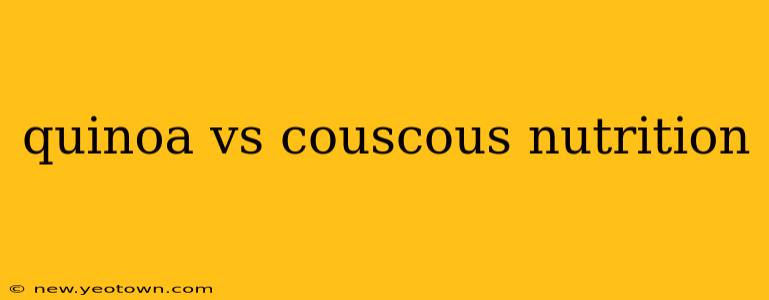Choosing between quinoa and couscous can feel like picking a favorite child – both are delicious, versatile grains that add a healthy boost to any meal. But when it comes to nutrition, which one reigns supreme? Let's dive into a head-to-head comparison, exploring their nutritional profiles and helping you decide which grain best suits your dietary needs.
Our story begins in two very different parts of the world. Quinoa, a complete protein powerhouse, hails from the Andes Mountains of South America, where it's been a staple food for centuries. Couscous, on the other hand, originates in North Africa and the Middle East, a tiny pearl-like grain made from semolina, durum wheat. This difference in origin and makeup leads to some fascinating nutritional variations.
Quinoa: The Complete Protein Champion
Quinoa stands out as a complete protein, meaning it contains all nine essential amino acids our bodies can't produce on their own. This is a rare find in the plant kingdom, making it a valuable protein source for vegetarians and vegans. But it's not just about protein. Quinoa is packed with fiber, contributing to digestive health and keeping you feeling full and satisfied. It's also a good source of iron, magnesium, and manganese – essential minerals for energy production and overall well-being.
What are the benefits of Quinoa?
Quinoa offers a plethora of health benefits beyond its impressive protein content. Its high fiber content aids digestion, prevents constipation, and promotes a healthy gut microbiome. The presence of antioxidants helps protect cells from damage caused by free radicals. And because it's a good source of complex carbohydrates, it provides sustained energy, preventing those mid-afternoon slumps.
Is quinoa gluten-free?
Yes, quinoa is naturally gluten-free, making it a safe and delicious option for those with celiac disease or gluten sensitivity. However, always check the label to ensure it hasn't been processed in a facility that also handles gluten-containing grains, as cross-contamination can occur.
Couscous: The Versatile Carbohydrate Source
Couscous, while not a complete protein like quinoa, still offers a good source of carbohydrates, providing the body with energy. It's lower in protein than quinoa but is a good source of fiber, particularly when choosing whole wheat couscous. The fiber content, although lower than quinoa's, still contributes to digestive health and satiety. Couscous also contains some essential minerals, such as iron and manganese, though in smaller quantities compared to quinoa.
What are the benefits of Couscous?
Couscous’s versatility in the kitchen is a major draw. Its quick cooking time makes it a convenient weeknight meal option. It readily absorbs flavors, making it a perfect base for various dishes. The carbohydrates provide quick energy, making it ideal for pre- or post-workout meals.
Is couscous gluten-free?
No, traditional couscous is not gluten-free as it's made from semolina, a durum wheat product. However, there are gluten-free varieties available on the market, often made from other grains like brown rice or quinoa. Always check the label carefully to ensure you’re selecting a gluten-free option if needed.
Quinoa vs. Couscous: The Nutritional Breakdown
| Nutrient | Quinoa (1 cup cooked) | Couscous (1 cup cooked) |
|---|---|---|
| Calories | ~222 | ~200 |
| Protein (grams) | ~8 | ~6 |
| Fiber (grams) | ~5 | ~3 |
| Iron (mg) | ~3 | ~1 |
| Magnesium (mg) | ~117 | ~20 |
(Note: Nutritional values can vary depending on the brand and preparation method.)
Which Grain is Right for You?
The "better" grain truly depends on your individual needs and preferences. If you're prioritizing complete protein and a higher fiber content, quinoa is the clear winner. If you're looking for a quick, versatile carbohydrate source and don't have gluten restrictions, couscous is a great option. Ultimately, both quinoa and couscous offer valuable nutrients and can be part of a healthy, balanced diet. Consider incorporating both into your meal planning for a diverse and nutritious approach to eating!

